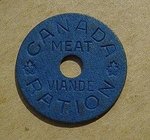Readie
Chief Master Sergeant
I have been watching the CD set from the Military History people and one is about the 'homefront'
I never realised that the American people were subject to food petrol rationing or, that the depression hit farmers were saved by the demands of war food production.
If you get the chance to view these CD's I recommend that you. Its very educative.
Cheers
John
I never realised that the American people were subject to food petrol rationing or, that the depression hit farmers were saved by the demands of war food production.
If you get the chance to view these CD's I recommend that you. Its very educative.
Cheers
John


